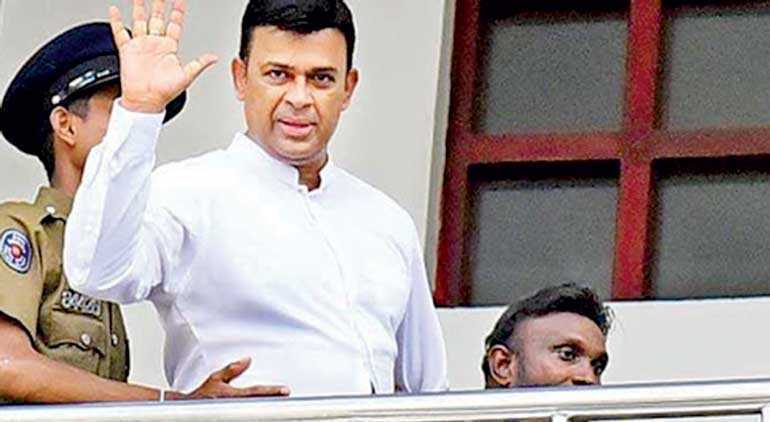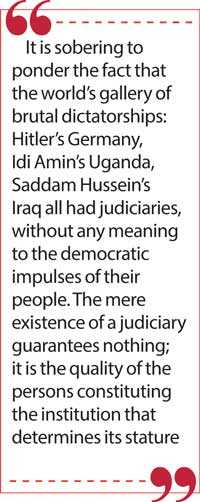Thursday Feb 19, 2026
Thursday Feb 19, 2026
Tuesday, 26 January 2021 00:41 - - {{hitsCtrl.values.hits}}

Ranjan Ramanayake
 The recent Supreme Court order in the Ranjan Ramanayake contempt case has aroused an unusual degree of public disquiet, with almost every person you talk to expressing an opinion on the severity of the four-year sentence of hard labour on the Member of Parliament.
The recent Supreme Court order in the Ranjan Ramanayake contempt case has aroused an unusual degree of public disquiet, with almost every person you talk to expressing an opinion on the severity of the four-year sentence of hard labour on the Member of Parliament.
Was the errant Member of Parliament cocking a snook at the Judiciary or scandalising the courts of justice, reducing the institution in the eyes of the public, rendering it ineffective?
Our courts are said to exercise the people’s judicial powers; court hearings are open to the public and judicial records are available for scrutiny; a society’s interest in what its courts are doing can only be welcome. Catering to the changing needs of the country, systems of governance are in a permanent state of evolution; correcting their faults, absorbing new ideas, remaining a force for the good.
While it has been argued by some American jurist that the judiciary is the least dangerous branch of the government, it is also perhaps the most misunderstood. A lot of the confusion arises out of the concept of justice, an idea, imprecise in formulation, and subjective, at best.
What we have are not divine courts, but courts constituted by humans, guided by rules, judging by the evidence led before them, and subject to review. Courts do not go on a voyage of discovery to do justice as each judge thinks fit, but attempt to resolve the issue before them according to the prevailing law. They are an arm of the government, and function within a given framework.
World’s gallery of brutal dictatorships all had judiciaries
It is sobering to ponder the fact that the world’s gallery of brutal dictatorships: Hitler’s Germany, Idi Amin’s Uganda, Saddam Hussein’s Iraq all had judiciaries, without any meaning to the democratic impulses of their people. The mere existence of a judiciary guarantees nothing; it is the quality of the persons constituting the institution that determines its stature.
In July 1944, a few German Generals, alarmed at the catastrophic consequences for Germany in Hitler continuing with the war, attempted a military “putsch” against the Nazi government. In challenging the ruthless Nazis, they were risking everything, their families, their lives. Many of the officers involved came from old military families, and were motivated by the highest ideals, the preservation of the German nation.
When the attempted assassination of Adolf Hitler at his military headquarters in East Prussia failed, the coup unravelled fast. Some of the leading conspirators were shot soon after arrest and others given over to the eager hands of the Gestapo (secret police) to be viciously ‘softened up’ before hauling them in front of the “Peoples’ Court” presided over by the infamous judge Roland Freisler, the President of the Nazi Court. Freisler, in red robes, sitting beneath a bust of Hitler, declared that justice will be meted out to the conspirators, as if Hitler was to judge the case himself!
After a mockery of a trial; it was said that the court appointed defence counsel outdid the state prosecutor, and almost equalled Freisler in the shrill denouncing of the accused; the conspirators were found guilty and condemned to death, the executions taking place almost immediately. There was no appeal.
In that black period of German history, legal niceties gave way to twisted slogans; the warped demands of Nazism, the prevailing ideology, held the country in an iron grip. To Germany’s East was the massive Soviet Union, equally ideological, where in the name of Communism thousands were being condemned after political trials. To entertain even an idea inconsistent with the prevailing policy of Stalin’s Communist Party, was a fatal error.
The judges in these cases (both in Russia and Germany) were Party appointed, and did not hide their allegiance to the leader, it was truly as if Hitler or Stalin were deciding the cases against their respective opponents personally!
This personal loyalty on the part of the judges to the leader goes against a very fundamental principle of natural justice, succinctly put in Latin “Nemo judex in causa sua”, no person can judge a case in which they have an interest. We recall the travesty that occurred when our last King meted out savage justice to the helpless Ahalepola family, a chieftain who had betrayed him. Even as late as early 19 Century, there was no concept of separation of powers in our governance, the King was the repository of all power; law maker, administrator and judge. Natural justice has not been that natural in history!
Conflict of interest
Today, the world is very much alive to the issue of conflict of interest; judges will disqualify themselves if there is any possibility of bias, of being a judge in his own cause. There are however a few exceptions to the rule, where institutions like the Parliament and courts are empowered to deal judicially with contempt committed on them; both the aggrieved and the judge.
A freely elected legislature and an independent judiciary are cornerstones of a democracy. Their functions, if impeded, could negate the workings of a democratic system; thus the power to deal with contempt committed against them. An order from a court of law is to be obeyed, if not, the entire system will come to a stop. It is assumed that these institutions possess the necessary wisdom in exercising their powers, particularly when they play the role of both the aggrieved, as well as the judge. For guidance and precedents, we look at similar systems, particularly those following English law principles.
In the British parliamentary tradition, several acts have been considered contempt of the House. These include: misconduct, interrupting the House, refusal to attend as a witness or presenting false evidence to the House (or committees) and corruption by acceptance of bribes. While the power to deal with contempt allows the House to conduct its business without disruption, in all its workings, the parliament is accountable to the people. The essence of democracy is the right to hold your elected representative to account, to criticise him, to campaign against him. A society’s maturity is reflected in the balancing of these conflicting aspects of a democracy.
That all our systems of governance; whether it be the idea of a presidential system, the parliament, or the courts, down to the frills and trappings of these institutions, owe their origin to ideas and methods developed in other cultures is a reality we cannot deny. Nearly all our laws are cut and paste jobs, copied from other countries.
Technology can be borrowed without the organic development that preceded. But, ideas of politics, governance and justice need a supporting culture, which could be absent in the adopting country. In the original country, these ideas of governance co-exist with other competing ideas, which hold them in check, qualify them, provide the necessary shadings. In a European country a member of parliament is not an automatic “prabuvaru” (elite class). He may enrich politics with his ideas or character, but does not enrich himself by politics. In the originating countries, a politician does not necessarily come in to politics to gain a life-time occupation, wealth, status, a chauffeur driven car or government jobs for his extended family.
But here, in the adopting country, these new institutions are viewed differently, public life is a gift from heaven, an opportunity to advance one’s family. The imported ideas of governance (presidential system, parliament, judiciary) are on their own, the new kid on the block, the only elite, and the place is otherwise empty of other ideas. There is an awkwardness as our institutions attempt to mimic something very foreign; contrived, they appear so unlikely.
Corruption
There is no denying that many of our public institutions have lost credibility, suffered and diminished in inept hands.
The responsibility for public accounts rests with the parliament, and naturally, parliamentarians must keep a vigilant eye on corruption, the evil that has destroyed many countries. Corruption today is not like the proverbial stealing of a jack fruit from a village garden. It is a sophisticated industry, the giver, the taker, and an army of collaborators working to hide the tracks.
The offence is not limited to the simple passing of money: the corrupter runs a buffet table with a range of goodies for the official and family to help themselves. Sometimes the favour is done overseas, away from local scrutiny. Fighting corruption is a comprehensive undertaking, multi-disciplined, there is no room for the naïve amateur, who will do more harm by his meddling, only succeeding to muddy the water.
To cry corruption, without providing admissible evidence, is to trivialise an overwhelming problem. Equally, it cannot be accepted that an entire arm of the government is scandalised without providing convincing proof; from a few particularities, a generality cannot be assumed. One judge is corrupt; therefore, all judges are corrupt? If such irresponsibility is a standard in an elected representative, the maturity of the voter should be very much in doubt.
Punishment
We then come to the punishment; imposed by a court whose decisions are not subject to review.
Chief Justice Warren E. Burger of the Supreme Court of the United States of America (1969-86) was appointed Chief Justice by President Richard Nixon (1969-74). He was a friend of Nixon, himself a lawyer. Burger was even considered onetime to run for Vice-Presidency with Nixon.
However, when the Watergate scandal hit the Nixon administration, Warren Burger was the Chief Justice. The investigators in the Watergate scandal wanted to subpoena tapes of Oval Office discussions which they suspected would carry incriminating evidence against the President. President Nixon’s lawyers argued unreviewable executive privilege protected the tapes. After all, these were private discussions at the epicentre of the most powerful country in the world.
The judicial bench led by Burger, rejected the argument and ordered compliance with the subpoena forthwith, holding that the White House must yield to the ‘demonstrated specific need for evidence in a pending criminal trial’.
We may assess the calibre of the judicial mind by reference to two statements from Justice Burger, one from a 1967 speech made to young college students at Ripon College where he compared the judicial system of the United States with that of Northern European countries, and the second from a judgment of court.
“I assume that no one will take issue with me when I say that these North European countries are as enlightened as the United States in the value they place on the individual and on human dignity. These countries do not consider it necessary to use a device like our Fifth Amendment under which an accused person may not be required to testify. They go swiftly, efficiently and directly to the question of whether the accused is guilty. No nation on earth goes to such lengths or takes such pains to provide safeguards as we do, once an accused person is called before the bar of justice, and until his case is complete.
“A court which is final and unreviewable, needs more careful scrutiny than any other. Unreviewable power is the most likely to self-indulge itself and the least likely to engage in dispassionate self-analysis. In a country like ours, no public institution, or the people who operate it, can be above public debate.”